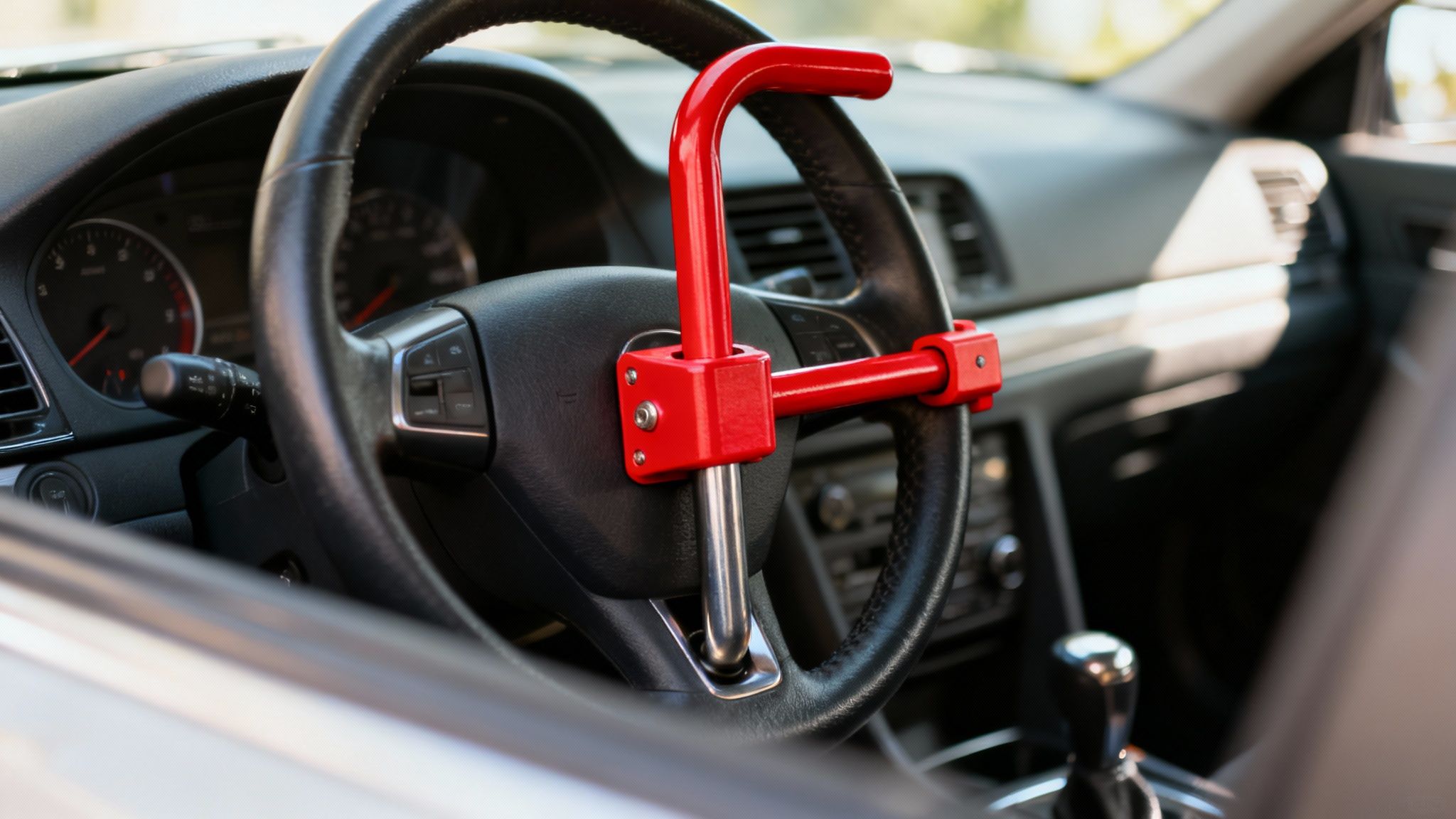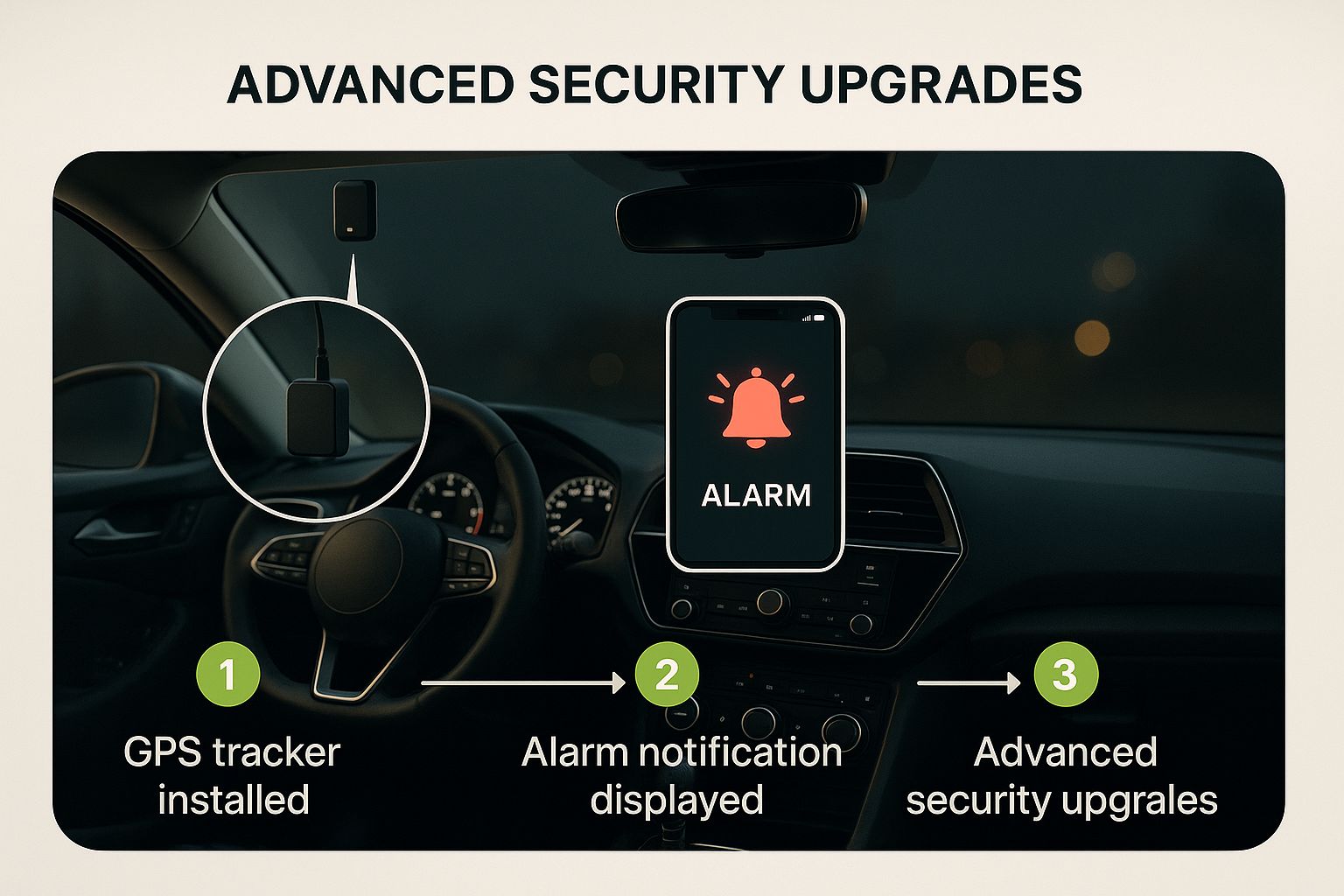How to Prevent Car Theft: A Practical UK Guide
- Top Motor Keys

- Oct 26, 2025
- 9 min read
Learning how to prevent car theft is less about spending a fortune and more about building simple, smart habits. The goal is to make your car look like too much trouble for any would-be thief, encouraging them to walk on by. It's a problem-solving approach that starts with understanding how criminals think.
At Top Motor Keys, we provide expert auto locksmith services across areas like Birmingham, Tamworth, Coventry, Wolverhampton, and Leicester, so we've seen first-hand what works and what doesn't. This guide is packed with real-world advice to help you secure your vehicle.
Building Your First Line of Defence

Before you consider high-tech gadgets, let's focus on the free, common-sense steps you can take right now. Most car thefts are opportunistic. A thief is looking for the easiest, quickest target, and your daily routine can either make their day or send them packing.
This is about more than just locking your doors. It’s about getting inside a thief's head, seeing your car through their eyes, and removing the silent invitations you might be accidentally offering.
Think Like a Thief
Put yourself in their shoes for a minute. You're walking down a street late at night, sizing up cars. Which one do you pick? The one tucked away in a dark corner with a coat slung over the back seat, or the one parked right under a bright streetlight, looking completely empty inside?
Real-Life Example: A customer in Birmingham had their window smashed for a gym bag left on the passenger seat. The bag was empty, but the thief didn't know that. The damage and inconvenience far outweighed the "value" of what was visible. An empty car promises zero reward.
Once you start thinking this way, you'll spot the little signals you’ve been sending. Your goal is to make your car look boring, difficult, and totally exposed.
Common Oversights and Simple Fixes
It’s the small slip-ups that give criminals the biggest openings. That quick 30-second dash into the corner shop is more than enough time for an opportunist to make their move.
Here are the most important habits to lock down:
Keep It Clear: Never leave anything on display. We’re talking charging cables, sat nav mounts, loose change, or even an old jacket. An empty car signals zero reward for the risk.
Park Smart: Whenever possible, choose a well-lit, busy spot. At home, your driveway is safer than the street. In a car park, aim for a space near the entrance or where staff can see it.
Double-Check the Lock: Key fobs aren't foolproof. Signal interference or distance can prevent them from working. Get into the habit of listening for the clunk or watching for the indicators to flash. If you’ve ever had that sinking feeling of locking your keys inside, knowing where to find reliable auto locksmith services for fast roadside help is crucial.
Hide Your Keys at Home: Don't leave car keys on a hook by the front door. This is a classic target for "fishing," where thieves use a rod and hook through your letterbox. Tuck your keys away, out of sight from doors or windows.
Putting Up a Physical Fight: How Old-School Deterrents Still Win

While smart habits are your first line of defence, sometimes you need something more obvious. Physical anti-theft devices are your car's visible armour. Think of them as a big, bold sign that screams, "This car is a hassle, move along" to any thief sizing up the street.
These devices are all about making a potential theft a slow, noisy, and frustrating ordeal. Imagine a thief uses a relay device to silently unlock your car. They slip into the driver's seat, ready for a quick getaway, and—clank—they're met with a huge chunk of metal around the steering wheel. Their high-tech attack has just been stopped by a low-tech, physical roadblock.
Choosing Your Weapon
The market is flooded with gadgets, but they mostly fall into three solid categories. Each one throws a different spanner in the works for a thief, so the best one for you might depend on your car and daily routine. Don't dismiss them as old-fashioned; today's versions are tougher than ever.
The main players in the physical security game are:
Steering Wheel Locks: The absolute classic, and for good reason. They are large, robust, and highly visible from outside the car, especially brightly coloured ones. A decent lock makes steering impossible without noisy power tools to cut it off.
Gearstick Locks: These clamp your gearstick in place (usually in park or reverse), making it impossible to select a gear. They’re a fantastic deterrent for manual cars and add an excellent extra layer of security for automatics.
Pedal Boxes: Less common but incredibly effective. A pedal box is a heavy-duty steel case that locks over your car's pedals, completely blocking access to the accelerator, brake, and clutch, literally stopping a thief in their tracks.
Making It Count
Just having one of these devices in your boot does nothing. The real power comes from using it consistently, every time you leave your car. Its visual impact is half the battle. A thief glancing through your window will immediately clock the extra work and risk involved.
Let’s be realistic: a determined professional with enough time and the right tools can get past almost any lock. The goal here isn't to be completely unbreakable. It's to make stealing your car so difficult and time-consuming that the thief gives up and moves on to an easier target.
When shopping, look for devices that are Sold Secure or Thatcham approved. This means they've been independently tested to withstand a proper assault. Using one daily is one of the single best things you can do to physically protect your car.
Fighting Back Against High-Tech Theft
Modern car theft has gone quiet. Forget the image of a thief smashing a window and hot-wiring a car. Today’s criminals can steal your vehicle from your driveway without a sound, using gadgets that trick your car into thinking the key is present. This is called a relay attack, and it's scarily simple.
Here’s how it works: one thief stands near your front door with a device that picks up the signal from your keyless entry fob. That signal is boosted and sent to a second thief by your car with another gadget. Your car thinks you are there, unlocks, and the engine starts. It's all done in silence.
The Simple Fix: A Faraday Pouch
So, how do you stop an invisible digital attack? The answer is surprisingly low-tech and cheap: a Faraday pouch. These are small bags or boxes lined with signal-blocking material. Think of it as a "dead zone" for your car key.
When your key fob is sealed inside a Faraday pouch, its signal can't escape. Thieves can stand outside your house with their relay boxes all night, but they won’t pick up a thing. It’s a simple, brilliant way to stop them in their tracks.
This small investment buys you huge peace of mind. Make it a habit to drop your keys into the pouch the second you get home. It's a tiny change to your routine that shuts down one of the most common modern theft methods.
Taking Control of Your Key Fob
Beyond the pouch, some car manufacturers let you turn off your key's wireless signal. Check your vehicle's handbook or the manufacturer's website to see if this is an option for your model. It’s often just a quick sequence of button presses on the fob.
This is handy if you’re out and don't have your Faraday pouch. It’s another layer of defence that puts you back in control. Understanding the tech in your pocket is half the battle; learn more in our practical guide to transponder car keys.
The threat is very real. Car theft in the UK has become a high-tech, organised crime, costing motorists over £1.5 billion a year. Criminals target keyless entry systems, making older security methods less effective. You can read more about the UK's growing car theft crisis on wecovr.com. By taking these digital precautions, you're directly fighting back.
Want to Properly Secure Your Car? Alarms and Trackers Are Your Best Bet
If you’re serious about protecting your pride and joy, it's time to look beyond simple physical locks. The real heavy hitters in vehicle security are electronic systems that can stop a thief or help you get your car back. Think of them as the high-tech brains of your car’s defence.
This infographic breaks down how these advanced security layers work together to create a powerful shield for your vehicle.

As you can see, combining smart alarm notifications with a hidden GPS tracker gives you a seriously robust, multi-layered defence system.
Your First Line of Defence: Alarms and Immobilisers
Most modern cars come with a standard-issue alarm and engine immobiliser. These are great for deterring casual opportunists. The immobiliser is a game-changer: a tiny electronic chip in your key has a digital handshake with the engine. No correct key, no start. It's why "hot-wiring" is largely a thing of the past.
But determined thieves often know the ins and outs of factory-fitted systems. This is where you need to step up your game with Thatcham-approved aftermarket gear. A Thatcham-approved device has been proven to withstand a real-world attack and may earn you a discount on your insurance premium.
For ultimate peace of mind, a Ghost Immobiliser is the next level. These systems are completely invisible, with no key fobs to steal or clone. To start the car, you enter a unique PIN sequence using existing buttons on your steering wheel or dashboard. You can discover more about how a Ghost Immobiliser provides next-level vehicle security and see why it’s become the go-to for owners of high-value vehicles.
The Power of a Good GPS Tracker
A GPS tracker is your ace in the hole. While other devices prevent theft, a tracker is all about recovery. If a professional gets past all your defences, the tracker gives you an incredible chance of seeing your car again, often within hours.
Just picture it: that heart-sinking moment you realise your car is gone. Instead of feeling helpless, you pull out your phone, open an app, and see its exact location on a map. You share that live data with the police. That's the power a tracker gives you.
Here's how they work:
The Tech: A small, discreet box is hidden deep inside your vehicle. It uses the GPS network to pinpoint its location and sends that data to you in real-time.
Running Costs: Most trackers require a subscription to cover mobile data and monitoring services. It's a small price for a near-guaranteed recovery.
Thatcham Categories: The best trackers are Thatcham-approved (look for Category S5 or S7). Top-tier S5 trackers even come with driver identification tags. If the car moves without the tag nearby, you get an immediate alert—even if the thief has your keys.
An investment in a quality alarm, immobiliser, or tracker transforms your car from an easy target into a fortress on wheels.
Frequently Asked Questions (FAQ)
Here are straightforward answers to the most common questions we hear from drivers in the Midlands about preventing car theft.
Q: Do steering wheel locks actually stop thieves?
A: Yes, in most cases. While a determined professional can eventually bypass any lock, a steering wheel lock's main job is to be a visual deterrent. It adds time, effort, and noise to a theft—three things criminals hate. For the average opportunist, seeing a big, brightly coloured lock is enough to make them move on to an easier target. It's a cheap and brilliantly effective layer of security.
Q: Are factory-fitted alarms and immobilisers enough?
A: They provide a good baseline of security and have virtually eliminated old-school hot-wiring. However, organised gangs often know the weaknesses of standard systems on popular models. If you drive a desirable car like a Ford Fiesta or live in a high-risk area, you should absolutely add another layer, like a physical lock or an aftermarket GPS tracker.
Q: My car has keyless entry. Am I at high risk?
A: Keyless entry is a primary target for modern "relay attacks." If you have this feature, you are at a higher risk. The simplest and most effective solution is to store your keys in a signal-blocking Faraday pouch the moment you get home. It’s a small, inexpensive habit that completely neutralises this threat.
Q: Is a GPS tracker worth it for an older car?
A: This depends on how much you rely on your car. Its book value might be low, but consider the cost and hassle of it suddenly disappearing. If your car is essential for your job, the school run, or daily life, a tracker is a brilliant investment. It gives you a strong chance of getting it back quickly, which is often worth far more than the car's sticker price.
Ready to get your car properly secured? At Top Motor Keys, we're experts in fitting advanced security like Ghost-II immobilisers and S5 vehicle trackers right at your doorstep across the Midlands, including Tamworth, Coventry, Wolverhampton, and Leicester. Don't leave it to chance—head over to https://www.topmotorkeys.co.uk to get a free quote and protect your motor today.
